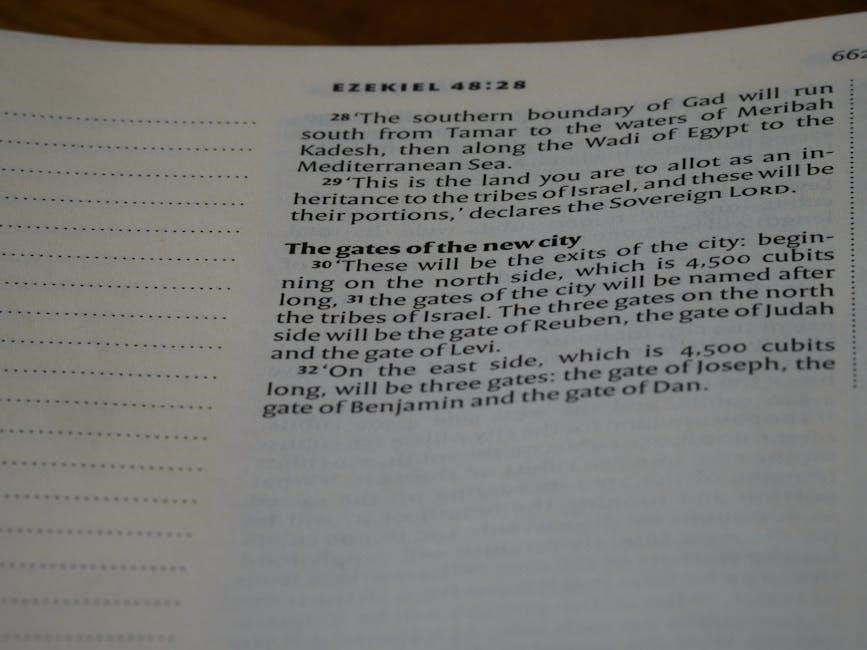The Book of Wars of the Lord is an ancient anthology of poetic victories celebrating God’s triumphs over Israel’s enemies, mentioned in Numbers 21:14, and is now available as a PDF for study and reflection.
1.1 Historical Background
The Book of Wars of the Lord is an ancient text referenced in Numbers 21:14, containing poetic accounts of Israel’s victories under divine guidance. Its origins likely date to early Israelite history, capturing battles and triumphs attributed to God. The book’s historical context suggests it was compiled during the wilderness period or early monarchy, reflecting the Israelites’ faith in God as a warrior. Medieval scholars, like Moses Nahmanides, linked parts of Numbers 21:27-30 to this anthology, indicating its significance in early Hebrew tradition. Though largely lost, its fragments remain vital to understanding ancient Israelite spirituality and warfare.
1.2 Mention in the Bible
The Book of Wars of the Lord is explicitly mentioned in Numbers 21:14, which states, “Therefore it is said in the Book of the Wars of the Lord: ‘What he did in the Red Sea, and in the brooks of Arnon.'” This verse is the only direct biblical reference to the book, suggesting it contains accounts of God’s victories and Israel’s military conquests. The mention indicates its significance as a historical and theological text within the biblical narrative, even though the full content of the book is not preserved in the Bible itself.
1.3 Purpose and Significance
The Book of Wars of the Lord serves as a historical and theological text, compiling accounts of God’s victories and Israel’s military conquests. Its purpose is to celebrate divine sovereignty and providence, reinforcing faith in God’s active role in history. The book’s significance lies in its preservation of ancient poetic traditions and its role as a source for understanding Israel’s identity and relationship with God. Despite its fragmented state, it remains a vital piece of Jewish tradition and a subject of fascination for scholars and believers alike, offering insights into the intersection of faith and warfare. Its availability as a PDF ensures modern accessibility for study and reflection.

Biblical Reference and Context
The Book of Wars of the Lord is briefly referenced in Numbers 21:14, serving as a scriptural source for understanding divine sovereignty and historical events, while connecting to broader biblical narratives of God’s role in Israel’s history.
2.1 Numbers 21:14 and Its Relevance
Numbers 21:14 references the Book of Wars of the Lord, citing its description of God’s actions in the Red Sea and the brooks of Arnon. This verse is the sole biblical mention of the book, providing a critical link to its content. Scholars infer that the book detailed Israel’s victories and poetic praises of God’s divine sovereignty. The reference highlights the book’s historical and theological significance, offering insights into ancient Israelite warfare and worship. PDF versions of the book, such as those available online, often include commentary on this verse, connecting it to broader biblical narratives and themes of divine triumph.
2.2 The Role of the Book in Scripture
The Book of Wars of the Lord serves as a scriptural reference, detailing Israel’s victories and divine interventions. Its mention in Numbers 21:14 highlights its role in chronicling God’s deliverance and sovereignty. The book is not part of the canonical Bible but is referenced as an ancient source of poetic and historical accounts. It complements biblical narratives by providing additional context to Israel’s conquests and worship. PDF versions of the book, such as those available online, often include commentaries that explore its significance within the broader biblical framework and its relevance to understanding divine warfare and triumph.
2.3 Connection to Other Biblical Texts
The Book of Wars of the Lord is closely linked to other biblical texts, such as Numbers 21:14, which directly references it. Its contents resonate with narratives in Joshua, particularly the miraculous event of the Sun and Moon standing still (Joshua 10:12-13). Additionally, its poetic style aligns with Psalms, which often celebrate divine victories. Moses Nahmanides suggested that parts of Numbers 21:27-30 may also originate from this book. These connections highlight its role in enriching the biblical account of God’s deliverance and sovereignty, making it a valuable complement to scriptural studies available in PDF formats.

Contents of the Book
The Book of Wars of the Lord contains 27 chapters detailing God’s victories, role as a warrior, and peacemaker, with poetic descriptions of Israelite triumphs.
3.1 Structure and Organization
The Book of Wars of the Lord is structured as an anthology of poetic and narrative passages, detailing God’s victories and Israel’s history. It is divided into 27 chapters, each focusing on specific aspects of divine warfare and triumphs. The book begins with introductory themes of God as a warrior, followed by detailed accounts of battles and geographic descriptions. The structure emphasizes both thematic and chronological organization, blending poetic hymns with historical narratives. While the original text is fragmented, the surviving passages, such as those referenced in Numbers 21:14, provide insights into its organized layout and spiritual themes;
3.2 Key Themes and Topics
The Book of Wars of the Lord explores themes of divine sovereignty, spiritual warfare, and God’s role as a warrior king. It emphasizes victories over enemies, highlighting God’s power and justice. The text includes poetic descriptions of battles, geographic notes, and reflections on faith. Themes of trust in God, obedience, and divine deliverance are central. The book also touches on the concept of holy war and the triumph of good over evil. These themes are presented through a mix of narrative and poetic styles, offering insights into ancient Israelite beliefs about God’s involvement in history and warfare.
3.3 Poetic and Prophetic Elements
The Book of Wars of the Lord features poetic and prophetic elements, with vivid descriptions of divine victories and geographic details. Its fragmented yet powerful style reflects ancient Hebrew poetry, emphasizing God’s triumphs. Prophetic undertones highlight divine plans and future victories, blending inspiration with historical accounts. The text’s poetic structure enhances its spiritual message, making it a unique blend of art and prophecy that resonates deeply with its themes of divine power and deliverance.
Theological Themes
The Book of Wars of the Lord explores divine sovereignty, spiritual warfare, and God as a warrior king, emphasizing His power and justice in conflict.
4.1 Divine Sovereignty in Warfare
The Book of Wars of the Lord underscores divine sovereignty, portraying God as the supreme ruler who orchestrates battles and determines outcomes. It highlights His authority over all conflicts, emphasizing that victories are not solely human achievements but manifestations of His will. The text illustrates God’s active involvement in warfare, showcasing His power and justice. This theme reinforces the idea that God is both the initiator and the conclusion of all battles, asserting His divine control over history and the fate of nations. The PDF versions of the book delve into these theological dimensions, offering insights into God’s role as the ultimate warrior king.
4.2 The Concept of Spiritual Warfare
The Book of Wars of the Lord explores the idea of spiritual warfare, framing battles as conflicts between divine and earthly realms. It illustrates how God’s power transcends physical combat, emphasizing spiritual triumph over evil. The text highlights the necessity of faith and trust in God’s sovereignty during struggles. Available as a PDF, the book offers insights into how spiritual warfare reflects broader cosmic battles, providing readers with a theological framework to understand and engage in their own spiritual journeys, fostering resilience and devotion in the face of adversity.
4.3 God as a Warrior King
The Book of Wars of the Lord portrays God as a Warrior King, emphasizing His divine authority and leadership in battle. It highlights His role in delivering Israel through military victories, showcasing His power and justice. The text underscores God’s sovereignty over all creation, with warfare serving as a means to establish His kingdom. This concept reinforces the idea of God as both a protector and a ruler, whose might is unparalleled. Available as a PDF, the book provides deeper insights into this theological theme, illustrating God’s dominion and His people’s reliance on His strength.

Historical and Cultural Significance
The Book of Wars of the Lord offers insights into ancient Israelite warfare and cultural identity, reflecting their belief in divine authority and national destiny through conquests.
5.1 Ancient Israelite Warfare Practices
The Book of Wars of the Lord provides insights into ancient Israelite warfare, detailing military strategies and divine interventions. It highlights God’s role as a warrior king, leading the army and ensuring victory through obedience to divine commands. The text includes geographical notes and poetic accounts of battles, reflecting the cultural and theological significance of warfare in Israelite identity. These practices emphasize the fusion of faith and combat, portraying war as a sacred act aligned with God’s will and the conquest of the Promised Land.
5.2 The Role of the Book in Jewish Tradition
The Book of Wars of the Lord holds a significant place in Jewish tradition, offering insights into divine sovereignty and Israel’s victories. It is referenced in Numbers 21:14 and is believed to contain poetic accounts of God’s triumphs. Medieval scholars like Moses Nahmanides linked it to scriptural passages, suggesting its influence on Jewish scriptural interpretation. The book is seen as a theological text emphasizing God’s role as a warrior and protector, shaping Jewish understanding of divine providence and warfare. Its fragments are studied within Jewish tradition to explore historical and religious themes, reflecting the enduring legacy of ancient Israelite beliefs.
5.3 Its Influence on Christian Theology
The Book of Wars of the Lord has influenced Christian theology by emphasizing God’s divine sovereignty and role as a warrior. Its mention in Numbers 21:14 and themes of spiritual warfare align with Christian concepts of God as a protector and deliverer. The book’s imagery of God as a warrior king resonates with Christian interpretations of Jesus Christ’s triumphant reign. Early Christian scholars drew parallels between the book’s victories and Christ’s conquest over sin, reinforcing the idea of spiritual warfare. This text remains a theological resource, inspiring devotion and reflection on God’s power and redemption in Christian traditions.

The Book of Wars of the Lord and Modern Scholarship
The Book of Wars of the Lord is studied in modern scholarship as an anthology of poetic victories, now accessible via PDF for theological analysis and research.
6.1 Current Research and Debates
Current research on the Book of Wars of the Lord focuses on its historical context and theological themes. Scholars analyze its mention in Numbers 21:14, exploring its role in ancient Israelite culture. Debates arise regarding its historical accuracy and spiritual symbolism. The book’s structure, including its poetic elements, is a key area of study. Modern scholarship often examines its relevance to contemporary theological discussions and its influence on Jewish and Christian traditions. The availability of PDF versions has facilitated widespread academic and personal study, sparking new interpretations and discussions about its significance in religious and historical contexts.
6.2 Archaeological Evidence and Correlations
Archaeological findings have shed light on the historical context of the Book of Wars of the Lord. Excavations in regions like Novgorod and studies of ancient monuments provide insights into the cultural and historical backdrop of the text. While direct archaeological evidence of the book itself is scarce, its descriptions of battles and geographical details align with known historical events. Scholars use these correlations to validate the book’s authenticity and understand its significance. The availability of PDF versions of the book has further facilitated research into its connection with archaeological discoveries, enriching our understanding of its historical relevance.
6.3 Comparative Analysis with Other Ancient Texts
The Book of Wars of the Lord shares thematic and stylistic similarities with other ancient texts, such as the Hebrew Bible’s poetic books (e.g., Psalms, Song of Songs) and extrabiblical works like the Book of Jashar. Scholars compare its victories of God to divine interventions in Mesopotamian and Egyptian literatures. The book’s poetic structure aligns with ancient Near Eastern battle hymns, while its theological themes echo in later works like The Art of War and the Iliad. These comparisons highlight its unique yet familiar place in the literary canon, offering insights into its cultural and religious significance. PDF versions facilitate such comparative studies.

Availability and Access
The Book of Wars of the Lord is readily available in PDF format, offering digital access to its 27 chapters describing God’s warrior attributes and victories.
7.1 PDF Versions and Digital Access
The Book of Wars of the Lord is accessible in PDF format, allowing readers to explore its 27 chapters detailing God’s victories and warrior attributes. This digital version provides convenient access to the text, enabling spiritual and academic study. Available for free download, the PDF includes commentaries and connections to biblical contexts. Readers can easily navigate through its sections, making it a valuable resource for both scholars and those seeking deeper theological understanding. The PDF format ensures that the content is preserved and widely accessible for modern audiences.
7.2 Translations and Commentaries
The Book of Wars of the Lord is available in various translations, providing accessibility to diverse linguistic audiences. Commentaries accompanying the text offer deeper insights into its theological and historical significance. These translations and analyses help readers understand the book’s poetic and prophetic elements, enriching their study of God’s role as a warrior king. The inclusion of scholarly interpretations makes the text more approachable for both academic and spiritual exploration, ensuring its relevance for modern readers seeking to grasp its ancient wisdom and cultural impact.
7.3 Rare Manuscripts and Historical Copies
Rare manuscripts of the Book of Wars of the Lord provide valuable historical insights, despite the text’s fragmented nature. These manuscripts, preserved in various archives, often include handwritten notes and marginalia, offering glimpses into ancient interpretation. Digital efforts have made these rare copies accessible, allowing scholars to study the evolution of the text. Historical copies, though scarce, remain treasured resources for understanding the book’s origins and significance in Jewish tradition and early Christian theology, bridging the gap between past and present scholarly exploration.

The Book of Wars of the Lord in Popular Culture
The Book of Wars of the Lord has inspired references in art and literature, symbolizing divine conflict and triumph, and influencing modern media and cultural narratives.
8.1 References in Literature and Art
The Book of Wars of the Lord has inspired literary works and artistic depictions, symbolizing divine conflict and triumph. Its poetic imagery, such as descriptions of God as a warrior, has influenced medieval commentators like Moses Nahmanides. The book’s themes of spiritual warfare and victory are reflected in art, often depicting symbolic battles between light and darkness. Modern literature occasionally references its anthology of poems, while digital versions, like the PDF, have made it accessible for contemporary artists and writers to draw inspiration from its rich, triumphant narratives.
8.2 Influence on Modern Media and Film
The Book of Wars of the Lord has subtly influenced modern media and film through its themes of divine conflict and triumph. Its availability as a PDF has made it accessible to creators, inspiring symbolic representations of spiritual warfare in films and series. While not directly adapted, its motifs of divine sovereignty and victory resonate in genres exploring faith and redemption. The book’s imagery, such as God as a warrior, has inspired visual and narrative elements in religious and fantasy films, reflecting its enduring impact on storytelling and visual arts.
8.3 Symbolism and Iconography
The Book of Wars of the Lord is rich in symbolism, often depicted through the imagery of God as a warrior king, emphasizing divine authority and triumph. Its themes of victory and judgment are visually represented in art and literature, with motifs like the Red Sea and Brooks of Arnon symbolizing liberation and divine intervention. The PDF versions highlight these elements, making them accessible for modern interpretation. The interplay of light and darkness in its narratives has inspired iconic representations of spiritual warfare, further cementing its influence on religious and cultural iconography.
Theological Debates and Controversies
The Book of Wars of the Lord sparks debates on divine violence, ethical warfare, and the nature of holy conflict, prompting scholarly critiques and apologetic defenses.
9.1 Interpretations of Divine Violence
Scholars debate the portrayal of divine violence in the Book of Wars of the Lord, with some viewing it as a historical record of God’s judgment and others interpreting it through a metaphorical lens. The text, now available as a PDF, describes God as a warrior king, leading to discussions on the nature of divine justice versus human morality. While some see it as a justification for holy war, others argue it symbolizes spiritual battles rather than literal violence. These interpretations highlight the complex theological implications of the book’s content.
9.2 Ethical Implications of Holy War
The Book of Wars of the Lord raises significant ethical questions about the concept of holy war and its justification. The text, available as a PDF, portrays God as a warrior king, leading to moral dilemmas about violence in His name. Critics argue that such narratives can justify harmful actions, while others see them as symbolic of spiritual battles. The book’s depiction of divine command theories challenges modern ethical frameworks, prompting debates on the balance between faith and morality. These discussions highlight the complexities of interpreting ancient texts in contemporary contexts, emphasizing the need for nuanced understanding and critical reflection.
9.3 Criticisms and Apologetic Responses
The Book of Wars of the Lord has faced criticism for its depiction of divine violence and holy war, sparking debates about the morality of such acts. Critics argue that these narratives contradict modern ethical standards, questioning how a benevolent God can be associated with warfare. In response, apologists emphasize the symbolic and historical context of these accounts, asserting they reflect ancient Israel’s understanding of God’s sovereignty. They argue that the text serves to illustrate divine justice rather than endorse violence, offering theological depth that transcends literal interpretation.

The Book of Wars of the Lord and Modern Spirituality
The Book of Wars of the Lord inspires modern spirituality by emphasizing divine sovereignty and trust in God’s plan, fostering personal growth and devotion in contemporary worship.
10.1 Application in Contemporary Worship
The Book of Wars of the Lord is increasingly used in contemporary worship to inspire trust in divine sovereignty. Its themes of victory and faith are incorporated into sermons and devotionals, fostering a deeper connection to God’s plan. The book’s emphasis on spiritual warfare resonates with modern believers seeking strength in challenging times. Additionally, its availability as a PDF enables easy access for personal reflection and communal study, making it a valuable resource for churches and individuals alike in their worship practices and spiritual journeys.
10.2 Lessons for Personal Spiritual Growth
The Book of Wars of the Lord offers profound lessons for personal spiritual growth, emphasizing trust in God’s sovereignty and faith in His plan. Its depiction of divine victories encourages believers to persevere through challenges, trusting in God’s power. The book’s themes of spiritual warfare remind individuals to rely on God’s strength rather than their own. By studying the PDF version, readers can reflect on these teachings, fostering a deeper understanding of God’s role in their lives and strengthening their personal relationship with Him through prayer and devotion.
10.3 Its Role in Modern Devotional Practices
The Book of Wars of the Lord plays a significant role in modern devotional practices, offering a rich source of inspiration and reflection. Its themes of trust, faith, and divine sovereignty resonate deeply with contemporary believers. The PDF version of the book is widely used in personal and group devotionals, providing accessible material for prayer and meditation. Many find solace in its depiction of God as a warrior king, which strengthens their spiritual resolve. The book’s poetic and prophetic elements also serve as a powerful reminder of God’s faithfulness, making it a valuable resource for modern spiritual disciplines and worship.